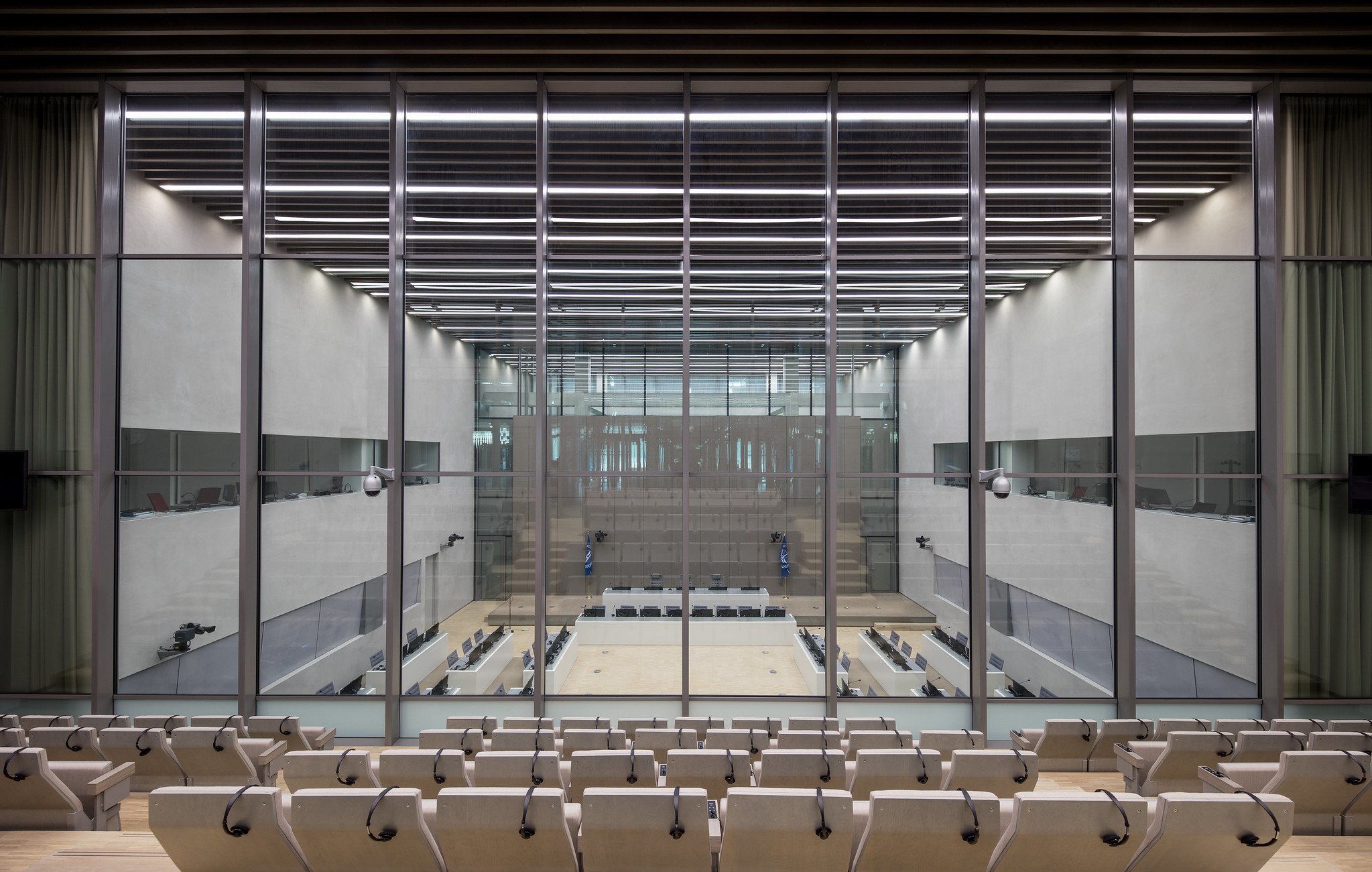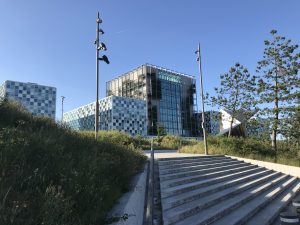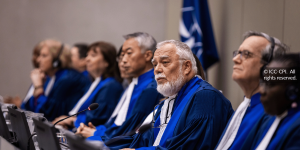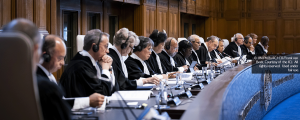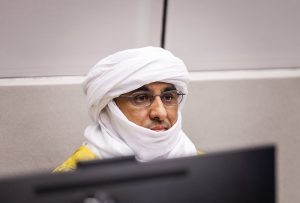
Sabina Grigore
Just Access Representative to the UN Office on Drugs and Crime
This article critically analyzes the activity of the International Criminal Court (ICC), highlighting several areas which are in need of improvement, among which one can count the outreach to civil society and victims, the transparency of the Court’s activities and, or the case prioritization strategies. It emphasizes the need for the ICC to address these concerns, advocating for reforms that can enhance the Court’s legitimacy, accessibility, fairness and efficiency in advancing international justice and accountability.
In 2002, the Rome Statute established the International Criminal Court (ICC). The ICC investigates and prosecutes individuals responsible for genocide, war crimes, and crimes against humanity. Since then, it has functioned as an independent court of last resort, investigating and prosecuting individuals responsible for the four core crimes of international law: genocide, war crimes, and crimes against humanity. The Rome Statute works under the complementarity principle. This means that domestic courts continue to have the duty to deliver justice. As such, the ICC remains a court of last resort when the domestic courts are unable or unwilling to provide a legitimate judgment. The Court has automatic jurisdiction only for crimes committed on the territory of a state which has ratified the treaty and for crimes committed by citizens of member nations who commit crimes elsewhere. For suspected criminals who are citizens of a state which has not ratified the Rome Statute, a United Nations Security Council resolution is necessary in order to proceed with the case. The ICC has no police force of its that can conduct investigations and arrests. Instead, it must rely on national police services and state cooperation to make arrests and seek their transfer to The Hague.1 The ICC has opened investigations into situations in countries like the Democratic Republic of the Congo, Uganda, Central African Republic, Darfur, Sudan, Kenya, Libya, Ivory Coast, Mali, Georgia, and, most recently, Ukraine. Nonetheless, the Court suffered from constant criticism ever since it has been created.
The ICC is regarded as a necessary institution for advancing international justice and accountability. However, criticisms have been leveled against it regarding its limited engagement with civil society, and the transparency of its activity has been defective.2 On the one hand, the Court is being criticized for not having done enough to raise awareness about its work, because it has not communicated effectively with affected communities, victims, or the general public. Numerous individuals, particularly those living in conflict-affected zones, are uninformed about the ICC’s mandate and do not know how to access its services. This lack of awareness and outreach can prevent victims from coming forward to report violations of the Statute, undermining by and large the credibility of the ICC’s work.3 Another issue is the lack of transparency of the ICC’s activities. Trials and investigations at the ICC take place behind closed doors, and the public has little access to information about active cases.4 Due to this lack of openness, the ICC may come under criticism for bias and unfairness which lead to suspicions and mistrust regarding the activity of the institution as a whole.5
Two other main areas of criticism faced by the Court concern its high costs and slow pace of justice. The Court is funded by contributions from its member states, and its budget has been criticized for being too high. In addition, the Court’s investigations and trials can take years to complete, leading to delays in justice for victims. One critical case in which both of these points of criticism are illustrated relates to the investigations in Afghanistan. In almost 20 years since the prosecutors of the ICC first considered opening an investigation into the crimes that occurred in Afghanistan, there has been little to no action toward bringing justice to Afghan victims. A month after the ICC authorized the Office of the Prosecutor to launch an investigation, the institution had to stop due to a request of the Afghan government to pursue the investigation themselves. Nonetheless, the conflict is of a protracted nature and crimes of an international nature have continued to occur throughout the whole time since the case came under the attention of the ICC.6 As such, limited by its own mandate and by the resource allocation decided upon by the Court, justice has not yet been delivered to the victims affected by the war in Afghanistan.
Moreover, since 2009, the legitimacy of the institution has been shaken by a gradual African disinterest in the Court, when it issued an arrest warrant for Sudanese President Omar Al Bashir, whose country is not a signatory to the Rome Statute. In 2015, the South African government refused to arrest Mr. Bashir. He traveled to South Africa to attend a meeting of the African Union, and South Africa, as a member of the court, was legally required to arrest him. Yet, the government allowed Mr. Bashir to leave the country, claiming that he had immunity as a head of state during the African Union summit meeting. The ICC has issued a judgment on this case, saying that South Africa was wrong about Al Bashir’s immunity. His immunity as a head of state has been superseded by UNSC Resolution 1593 (2005) which referred Darfur to the ICC. Concomitantly, sitting heads of state can be held responsible for crimes in their individual capacity, so that Al-Bashir could have been arrested and tried at the ICC. Nonetheless, South Africa and other African states have expressed deep dissatisfaction with what they consider a tool of Western imperialism.7 As a result, Burundi was the first country to withdraw its membership from the ICC in 2017.8
In a world of fake news...
…you’ve got to keep your finger on the pulse.
The Just Access newsletter is your gateway to human rights analysis you can trust.
Sign up now to stay up to date with the best of Just Access’s blogs, podcasts, and reports.
Most recently, following the arrest warrant of Vladimir Putin, issued by the Pre-Trial Chamber II of the ICC, in connection with the deportation and transfer of children as war crimes,9 and based on the rapid investigations that resulted shortly after the beginning of the war in Ukraine,10 the Court faces another wave of criticism regarding its practices, particularly due to matters of prioritization and resource allocation. Even though the ICC has opened an investigation into crimes committed during the conflict in Ukraine, it has encountered many challenges, including a lack of access to the conflict zone and scant cooperation from Ukrainian authorities. In order to discuss the significance of holding those responsible for international crimes accountable, justice ministers from all over the world gathered in Ukraine in March 2023 for the Justice Ministers’ Conference. Ukraine had a crucial opportunity to emphasize the value of ongoing efforts to prosecute offenders at the conference. However, because Ukraine has not ratified the Rome Statute, its cooperation with the Court has been erratic. Despite these challenges, which are also present in other instances investigated by the Court, the ICC dedicated a significant part of its resources to pursuing this case. Moreover, the Court benefitted from a significant increase in the level of support from its members, which has been unprecedented. This imbalanced support received by the ICC within the past year exacerbated the already existing views about an inconsistent application of its mandate, increasing the damaging perception that the Court is biased and politicized.11
Despite this criticism, the ICC continues to be a fundamental organization for advancing justice and responsibility for violations of international criminal law. Thomas Lubanga Dyilo, who founded and led the Union of Congolese Patriots, and Jean-Pierre Bemba, a previous vice-president of the Democratic Republic of Congo, are two well-known individuals who have been prosecuted by the Court. It is impossible to downplay the importance of the Court’s work in looking into the crimes perpetrated in Ukraine. In any case, the ICC ought to react to the criticism brought to its activity if it is to be truly effective. This incorporates addressing perceptions of bias, expanding its jurisdiction to incorporate non-member states, and improving the speed, transparency, and effectiveness of its investigations and trials, while also improving its outreach towards victims, as well as civil society.
1 International Criminal Court, ‘How the Court Works’, <https://www.icc-cpi.int/about/how-the-court-works> Accessed 24 April 2023.
2 Lohne Kjerti, ‘Global civil society, the ICC, and legitimacy in international criminal justice’, The Legitimacy of International Criminal Tribunals (CUP, 2017); Regina Rauxloch, ‘Good intentions and bad consequences: The general assistance mandate of the Trust Fund for Victims of the ICC’ (2021) 34 LJIL 203.
3 Redress, ‘Victims and the ICC: Still room for improvement Paper’ prepared for the 7th Assembly of States Parties The Hague, 14-22 November 2008; International Federation for Human Rights, ‘Outreach to Victims, Affected Communities, and Civil Society: an Analysis of Prosecutor Bensouda’s Legacy at the ICC’, 30 November 2021 <https://www.fidh.org/en/issues/international-justice/international-criminal-court-icc/outreach-to-victims-affected-communities-and-civil-society-an> Accessed 25 April 2023.
4 Sigurd D’hondt, ‘Why being there mattered: Staged transparency at the International Criminal Court’ (2021) 183 JoP 168.
5 Ignaz Stegmiller, ‘The International Criminal Court and Mali: Towards More Transparency in International Criminal Law Investigations?’ (2013) 24 CLF 475.
6 Elizabeth Evenson, ‘International Criminal Court Should Reach Decision on Afghanistan’, Human Rights Watch <https://www.hrw.org/news/2022/09/12/international-criminal-court-should-reach-decision-afghanistan> Accessed 24 April 2023. For Just Access’s interview with Ms. Evenson, see <https://podcast.just-access.de/1928821/11836696-episode-1-introducing-the-work-of-human-rights-watch-hrw> and <https://podcast.just-access.de/1928821/11870184-episode-2-improving-access-to-justice>.
7 Norimitsu Onishi, ‘South Africa Reverses Withdrawal From International Criminal Court’ (New York Times, 8 March 2017) <https://www.nytimes.com/2017/03/08/world/africa/south-africa-icc-withdrawal.html> Accessed 24 April 2023.
8 Timothy Jones, ‘Burundi becomes first country to leave International Criminal Court’ (Deutsche Welle, 27 October 2017) <https://www.dw.com/en/burundi-becomes-first-country-to-leave-international-criminal-court/a-
41135062> Accessed 24 April 2023.
9 ICC, ‘Situation in Ukraine: ICC judges issue arrest warrants against Vladimir Vladimirovich Putin and Maria Alekseyevna Lvova-Belova’, Press Release 17 March 2023. <https://www.icc-cpi.int/news/situation-ukraine-icc-judges-issue-arrest-warrants-against-vladimir-vladimirovich-putin-and> Accessed 24 April 2023.
10 For more information See Just Access, ‘Reflecting on One Year of Conflict: The Ongoing War in Ukraine’, <https://just-access.de/reflecting-on-one-year-of-conflict-the-ongoing-war-in-ukraine/> Accessed 25 April 2023.
11 Coalition for the ICC, ‘Justice Ministers conference on Ukraine is a vital opportunity for consistent and sustained support for all situations under the jurisdiction of the ICC’, <https://www.coalitionfortheicc.org/news/20230315/justice-ministers-conference-ukraine-vital-opportunity-consistent-and-sustained> Accessed 24 April 2023.


